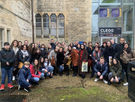YOUNG STUDENTS AS POLITICAL GAME CHANGERS
Mission
The mission of the Game Changers project is to address the critical issue of young students’ increasing disengagement in politics, democracy, and European values. It aims to develop an easy-to-use model for secondary schools that aligns with students' interests and the dynamics of 21st-century culture. The project aspires to empower young students to take ownership of political discourse and democratic engagement through innovative open schooling practices, which are co-created by the students themselves. By involving students as active participants, the initiative seeks to redefine how schools organize and inspire political engagement.
Challenge
The challenge lies in fundamentally questioning and deconstructing traditional notions of politics, democracy, and European values, as these concepts often fail to resonate with younger generations. Schools must create inclusive and innovative spaces where students can lead the way in redefining these ideas within their own contexts. Current institutional structures frequently limit youth participation by maintaining hierarchical, adult-directed approaches. This project seeks to dismantle these barriers, enabling a genuine shift to youth-driven innovation and engagement.
Methodology
The methodology combines three key approaches to foster engagement and prevent disinterest in politics among secondary school students. First, the didactic methodology replaces traditional teaching methods with open schooling practices to cultivate curiosity and involvement. Second, the co-creation methodology involves students in the design and development of engagement strategies, moving away from top-down theoretical models. Lastly, the subjective engagement methodology addresses the unique characteristics and criteria of 21st-century youth, ensuring that their specific needs and perspectives are at the forefront of the project.
Outcomes
The project will unfold through a structured work programme. Initial phases focus on capacity building among partners and student teams, followed by youth-led dialogues that challenge conventional political discourse. Subsequent phases will involve open schooling, where students act as “politics detectives,” exploring local and virtual dimensions of political engagement. Finally, the students will construct an alternative political discourse, drawing on their findings and receiving feedback from educators, researchers, and policymakers. The outcomes of this process will include a comprehensive school guide, a reflective study on youth political disinterest, a video showcasing student engagement, and a policy paper addressing the European Union’s challenges in connecting with younger generations.
Through these innovative approaches, the Game Changers project seeks to inspire a new generation of politically engaged young people and transform how schools nurture democratic values and civic participation.
Project financed by: ERASMUS +






























